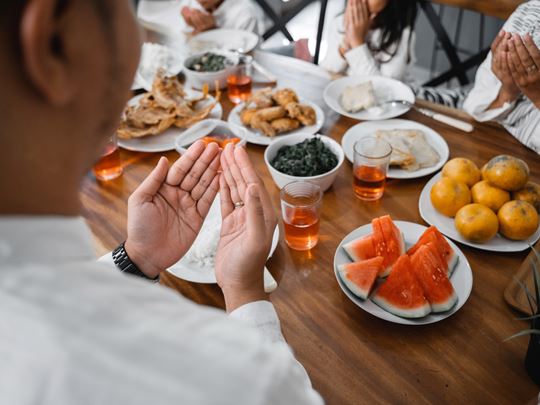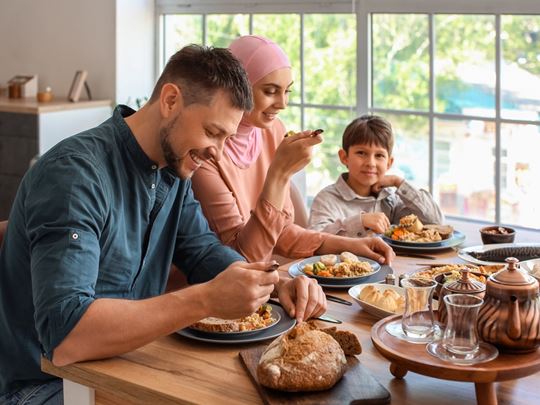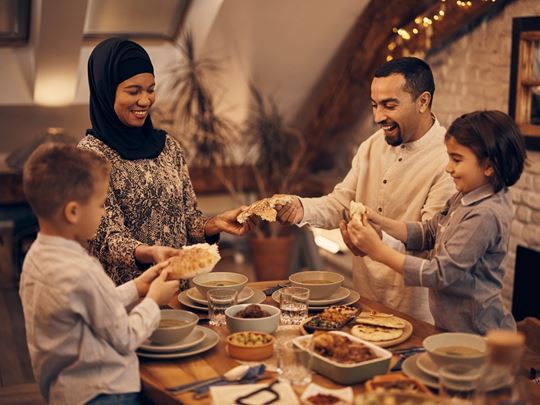Fasting during Ramadan with foster children
Here is some helpful information and guidance on how Muslim foster parents can make Ramadan a memorable and meaningful month for their family and foster child.
Young people in care and fasting
Fasting is one of the five pillars of the Islamic faith, so it’s a big part of Ramadan. Fasting involves abstaining from food, drink, smoking and sexual relations from dawn until sunset, and it is believed to cleanse and purify the soul and strengthen one's faith.
Once a Muslim person reaches puberty (usually around 12 years old), they are expected to take part in the month-long fast during Ramadan. However, it’s not a compulsory obligation for everyone. Due to the physical and mental demands of fasting, certain people are exempt:
- Young children
- Pregnant women
- Breastfeeding mothers
- Those who are menstruating
- Elderly and ill people
- People travelling
The personal circumstances of young people in foster care also need to be considered when it comes to fasting. Sadly, most children are placed into the care system due to abuse and/or neglect. In a lot of cases, food may not have been available consistently, or could have been withheld or used as a punishment. This can lead to serious issues such as hoarding food, stealing food, bingeing on food or developing a fear of food. That’s why the refusal or restriction of food can be traumatising for kids in care.
It’s vital that foster parents are sensitive towards these potential food issues during Ramadan, and cultivate a safe and loving environment where no pressure or judgement is placed onto the young person in their care.
4 ways to make fasting safe for your Muslim foster child
Communicate
As Ramadan approaches, have open conversations about what they’re worried about as well as what they’re looking forward to. That way you can work together and decide whether or not fasting is a safe thing for them to do as this point in time. As their foster parent, you’ll be aware of their issues, behaviours and triggers around food, but the poignancy of Ramadan might intensify these emotions and present challenges you haven’t dealt with before.
Make appropriate meal plans
Based on the foster child's needs and preferences, create a meal plan that includes foods they can eat before dawn and after sunset during Ramadan. This will help ensure that they are well-nourished and able to fast comfortably, if they are of age, capable and willing to do so.
Involve your foster child in meal preparation
Get them involved in preparing meals for Ramadan. This will help them feel more connected to the process and give them a sense of ownership over their food choices. It’s also a great way to bond and teach them about the origins and purpose of Ramadan.
Encourage spiritual activities instead
Instead of focusing on the fasting aspect of Ramadan, encourage your foster child to participate in spiritual activities such as reading the Quran, performing prayers, and engaging in acts of charity. This will help them develop a deeper understanding of the significance of Ramadan and feel more connected to their faith.
The young person in your care needs to feel empowered with choice, so if fasting causes too much distress and they’re not ready to participate because of personal reasons, reassure them this is okay. If they feel guilty about not being able to take part, you could ask if they’d be happy to do charitable acts as a means to make up for the lost fast. Your main priority as a foster parent is the wellbeing of your young person, which is why fasting during Ramadan and their emotional health must be well-balanced.
Remember, fostering a child is a great responsibility and requires sensitivity and patience. By supporting your foster child with their food issues during Ramadan, you can help create a positive and nurturing environment for them to grow and thrive.
Celebrating Ramadan with foster children
Fasting is just one aspect of Ramadan. The other pillars of Islam are the declaration of faith; prayer; giving money to the poor; and making the pilgrimage to Saudi Arabia for ‘Hajj’. And Ramadan is definitely a time to reflect on these and engage in activities that align with Islamic values.
Firstly, it’s important you’re aware of how your foster child has experienced Ramadan in the past. Even as a Muslim foster family, you might not do things exactly the same as what your young person is used to. Managing these expectations is important to ensure you have a positive and enlightening Ramadan. However, it could be refreshing and also a welcome distraction for your foster child to experience a different approach to Ramadan.
3. Charitable acts
Traditionally, children are encouraged to donate a few pounds from their pocket money, however this isn’t always appropriate for young people in foster care. Poverty or coming from a very poor family could be the reason why they’re in care, so asking them to give away what little they have could be insensitive. After all, they themselves are a child in need. But it’s still important for them to learn about charitable giving as part of their faith, and monetary donations aren’t the only way to be charitable.
- Let them contribute to your family’s charity donations by earning money through a sticker or reward chart. The more stars they get, the more money they earn to give to charity during Ramadan.
- Encourage them to donate their time through volunteering. This could be helping out at a local food bank or homeless shelter, distributing food to those in need, or visiting the sick and elderly.

4. Involve them in prayer
Teach your foster child about the importance of prayer and why it’s an integral part of Ramadan. If your Mosque or place of worship is different to theirs, be mindful about this and ensure your religious community will be welcoming of them during daily prayers. They can also recite the Quran and engage in other spiritual practices such as dua (supplication) and dhikr (remembrance of Allah).
5. Spend time with family
Ramadan is a great opportunity for the child in your care to bond with their foster family. They can engage in family activities such as cooking and preparing iftar meals together, visiting family and friends, or attending community events. This togetherness could help in their healing process and give them a sense of belonging.
6. Learning about Islamic history and culture
It’s crucial for children in care to stay connected to their faith, heritage and culture. They have already experienced loss, so the teachings of Islam could be a really good way to strengthen their faith and remain positive for the future.
7. Attend Community Events
Ramadan is a time of community and togetherness, and Muslims often attend community events such as iftar dinners and taraweeh prayers during the month. As a foster parent, you can attend these events with your foster child and help them feel connected to the larger Muslim community. This will also provide an opportunity for your foster child to learn about the cultural and religious traditions associated with Ramadan.
8. Celebrating Eid al-Fitr
Eid al-Fitr is the celebration that marks the end of Ramadan. Muslim foster children can participate in the festivities by wearing new clothes, exchanging gifts, and attending Eid prayers at the mosque. They can also participate in community events and gatherings to celebrate the end of the month of Ramadan.
Ramadan may present challenges you’ve not dealt with before, but with a gentle, patient approach, you can make it a truly special and meaningful time for the child in your care. And when you foster with Active Care Solutions, we’ll be here to support you whenever you need us. Day, night or any time in between.
If you’re a follower of the Islamic faith and want to help vulnerable Muslim children in your community, please get in touch with us today. We are a faith-based fostering agency and specialise in placing children with families of the same religion. This enables them to thrive in an environment that understands their needs and beliefs, as well as staying connected to their faith.
Want to know more?
Find out more about becoming a foster parent or take your first step to fostering and get in touch today - we'd love to hear from you.







